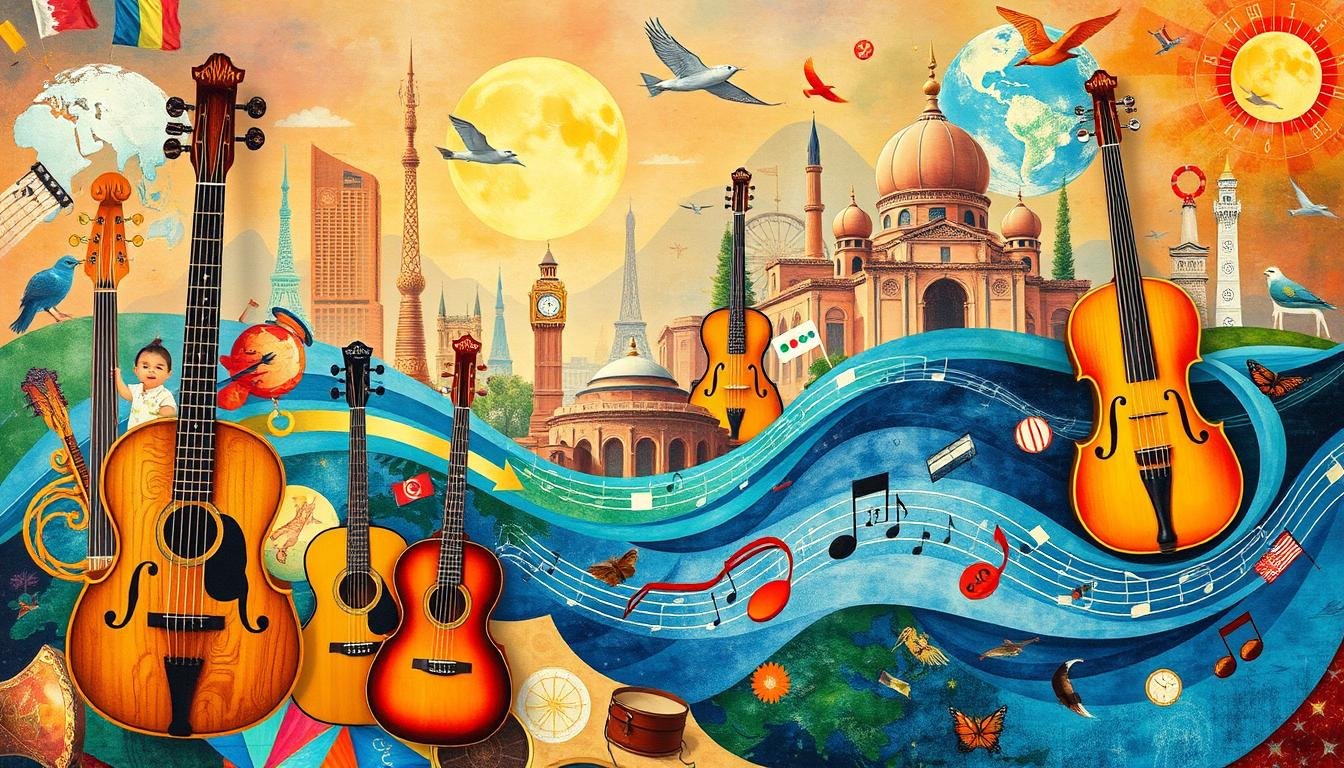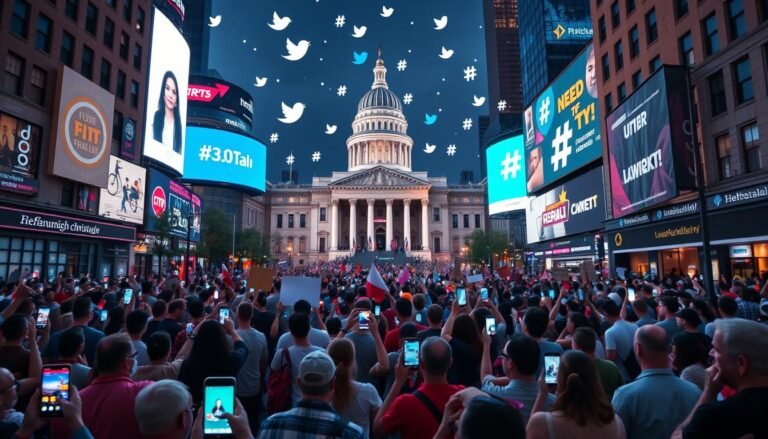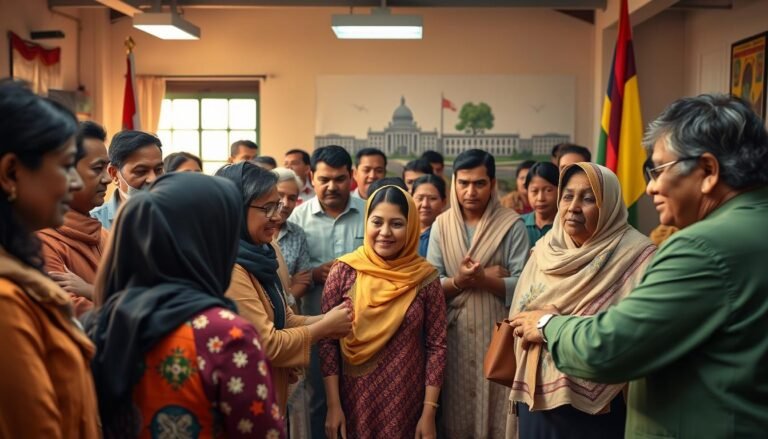Sociology of Music: How Society Influences Sound
Have you ever thought about why some songs touch the hearts of many? It’s all about the deep link between music and society. By looking into the sociology of music, we learn how culture affects our shared experiences.
Music is more than just sounds; it reflects our society. From classical to hip-hop, each type of music shares a story about us. Let’s explore this world where music and culture meet.
A recent study showed how music tastes form. It found that 70.50% of college students think their family shapes their music choices. This shows how our surroundings influence our music.
Also, 76.47% of these students said their music tastes differ from their parents’. This gap shows how society changes over time, affecting our music.
Almost half of the students saw hip-hop as the most relevant music today. This shows how some music styles capture the spirit of our times. They let us express ourselves and comment on society.
Key Takeaways
- Family influence plays a crucial role in shaping musical preferences
- Generational differences in music taste reflect societal changes
- Hip-hop is perceived as highly relevant in contemporary society
- Music genres evolve as a result of cultural blending
- Sound, language, and music are central to human communication and sociability
Introduction to the Sociology of Music
The sociology of music looks at how music shapes and reflects society. It studies the creation, reception, and use of music in our daily lives. This study reveals deep insights into human behavior and social structures.
Definition and Scope of Music Sociology
Music sociology explores the link between music and society. It covers topics like how musical tastes show social class and music’s role in social movements. This field sees music as more than just sounds; it’s about the activities and interactions around it.
Historical Development of the Field
The study of music sociology started early in sociology. It really took off in the late 1970s, with more academics getting interested. Since then, the field has grown a lot, shown by the rise in research papers:
| Time Period | Number of Articles |
|---|---|
| 1985-1989 | 265 |
| 1990-1994 | 340 |
| 1995-1999 | 507 |
| 2000-2004 | 695 |
Key Theorists and Their Contributions
Many scholars have made big impacts on music sociology. Howard Becker’s work on art worlds in 1982 was key. Richard A. Peterson introduced the “cultural omnivore” idea in 1996. Tia DeNora’s 2000 study on music in everyday life gave us valuable insights. These ideas have deepened our understanding of music’s role in society.
“Music is the universal language of mankind.” – Henry Wadsworth Longfellow
The Power of Music in Shaping Society
Music does more than just entertain us. It’s a strong cultural force that changes how we think, feel, and act. From ancient times to now, music has been key to human society. It changes with our cultures and beliefs.
Music as a Cultural Force
Music has always pushed for social change. It challenges old ideas and highlights important issues. For example, protest songs in the Civil Rights movement helped get people involved and spread messages of equality.
Impact on Social Bonding and Communication
Music brings people together. When we sing or play music with others, it releases happy feelings. This shared activity can overcome communication gaps, making music a language everyone can understand.
Role in Promoting Human Rights and Social Change
Music is a key tool for making the world better. It highlights global injustices and encourages change. Different music genres, like rap and rock, express feelings of struggle and rebellion. They shape and reflect how we see society.
“Music can change the world because it can change people.” – Bono
Studies show music affects the brain in many ways. It boosts attention, perception, and emotion. This shows music’s power to change society and drive progress. It’s a strong force in our changing world.
Music’s Influence on Individual and Collective Identity
Music is a universal language that goes beyond just fun. It plays a key role in shaping our identities, both as individuals and as groups. The way music and social identity meet is interesting. It shows how tunes and beats mirror and shape our culture.
Studies show music is a strong way for young people to express themselves and find their identity. Hip-hop, for example, lets young people build parts of their identity. This effect isn’t just for urban black youth in America. It also reaches out to the African diaspora and white youth, showing how music reflects society.
In China, research on online music communities shows how music affects daily life. Young people use popular music and technology to make friends and connect with others. This shows how music helps people bond and create identities online.
“Music is the shorthand of emotion.” – Leo Tolstoy
The emotional impact of music is huge. It makes us feel certain ways, changes our mood, and even affects our body. This emotional link is key in forming our sense of self and group identity. When we connect with certain music, we often feel part of a certain group or subculture.
From rock to pop, music reflects the times we live in. It tells stories of the era, showing what society values and believes in. As music changes, it keeps taking on new roles in society. It acts as both a mirror and a shaper of our shared identity. Looking into how music affects identity gives us deep insights into the link between art, emotion, and society.
Sociology of Music: How Society Influences Sound
Music and society are closely linked. The culture of a society greatly affects music creation. From tribal drums to classical orchestras, music shows the values and experiences of its makers and listeners.
Cultural Context and Musical Creation
Different cultures produce unique musical styles. For example, blues came from African American life in the southern U.S., showing hardship and strength. Classical music in Europe grew with the continent’s social and artistic changes.
Societal Norms Reflected in Musical Genres
Music reflects the norms of its time. Rock and roll in the 50s and 60s challenged old values, showing new attitudes towards authority and self-expression. Hip-hop in the 70s spoke to urban life and social issues.
Social Movements and Their Musical Expressions
Music has played a big part in social movements. Songs like “We Shall Overcome” during the Civil Rights Movement helped break down barriers and build empathy. It brought people together, taught them, and supported change.
“Music can change the world because it can change people.” – Bono
Studies show music education in schools boosts grades and social skills. In Metro Nashville Public Schools, music students had better attendance, GPAs, and test scores than those without music programs.
| Impact of Music Education | Percentage |
|---|---|
| Teachers reporting academic improvement | 68% |
| Teachers noting enhanced social-emotional skills | 94% |
The study of music sociology is always changing. It looks at how music influences and is influenced by society. Music helps us understand social trends and human behavior through its many forms.
The Relationship Between Music and Emotion
Music deeply affects how we see the world, thanks to its emotional power. It touches our brains in many ways, changing our feelings and thoughts deeply.
Neurological Effects of Music on the Brain
Music makes different parts of the brain work together. This is why it can make us feel better, spark creativity, and change how we see things.
Music Therapy and Psychological Well-being
Music is more than just fun. It has been shown to help with attention, memory, and mental health. Music therapy uses sound to heal and improve well-being.
Cultural Variations in Emotional Responses to Music
How people feel about music varies across cultures. These differences show how music fits into our culture and helps shape who we are.
| Aspect | Finding | Impact |
|---|---|---|
| Listening Motivations | 3 main dimensions: arousal/mood regulation, self-awareness, social relatedness | Explains why people engage with music |
| Emotional Expression | Music can express basic emotions like Happiness, Sadness, Fear, Anger | Influences emotional communication in society |
| Cultural Influence | 85% of successful songs influenced by music producers | Shapes cultural narratives and trends |
Music’s link to emotion shows its big impact on us and society. It affects our personal well-being and how we express our culture. Music is key to our emotional world.
Music Production and Distribution in the Digital Age
The digital revolution has changed the music industry a lot. It has changed how we make, share, and listen to music. This shows how society affects music and how music affects society.
Now, making music is easier thanks to digital tech. Instead of using expensive tape recorders, we use desktop computers. This has made recording music more accessible to everyone.
MP3 and AAC files have changed how we store and share music. We can now carry hundreds of songs in one device. This has changed how we enjoy music.
“The digital world allows for easy recall of configurations from previous recording sessions, simplifying workflows and enhancing efficiency in studio operations.”
Streaming platforms and social media have changed music distribution a lot. They’ve changed how we find new music and how artists connect with fans. This has changed the music industry’s business side.
| Year | Event | Impact |
|---|---|---|
| 1999 | Launch of Napster | Facilitated music piracy and digital consumption |
| 2001 | iTunes debut | Transformed digital music distribution |
| 2013 | Physical music sales drop | Returned to early 1970s levels |
These changes have made new kinds of music and styles popular. The digital age keeps changing how we make, share, and listen to music. It’s becoming a big part of our culture.
The Role of Music in Social Stratification
Music plays a big role in our society, often in ways we don’t see. It’s a strong tool that shows and shapes social class. Let’s look at how our musical tastes and knowledge show where we stand in society.
Music Taste as a Social Class Marker
What we listen to tells a lot about our background. Classical music, opera, and jazz are often linked to higher social classes. On the other hand, genres like hip-hop or punk started as voices for those outside the mainstream. Our music choices might show more than just our mood – they can hint at our social status.
Cultural Capital and Musical Knowledge
Knowing about music can be a form of cultural wealth. People who can talk about rare vinyl records or high-end audio gear might be seen as culturally sophisticated. This knowledge acts like a currency in certain social circles, affecting how others see us.
The Concept of Cultural Omnivorousness
Now, having varied musical tastes is becoming more common. This trend, called cultural omnivorousness, is changing how we view music and social class. People now enjoy both classical symphonies and punk rock concerts. This shift shows how music’s cultural impact is evolving, breaking down old class barriers.
Understanding these connections helps us see how music reflects and shapes our society. It’s not just about entertainment – it’s a mirror of our social world.
Globalization and Its Impact on Music Cultures
Globalization has changed music cultures all over the world. Societies are now more connected, leading to a mix of musical styles. This has created new genres like Afrobeats from West Africa and Bhangra from the Punjab region.
Digital technology has been key in this change. In 2005, Smithsonian Folkways Records launched an online resource with thousands of audio recordings. This made music from different cultures easier to access than ever. Now, artists and fans can mix different cultural sounds into their music.
The UNESCO Intangible Cultural Heritage List protects musical traditions like Mongolian throat singing and Spanish Flamenco. These efforts show how important it is to keep cultural diversity as globalization brings things closer together.
While globalization has made it easier for different cultures to share music, it also raises concerns about cultural appropriation. The music industry is trying to find a balance between global influences and keeping local music alive. This issue is affecting how music cultures evolve worldwide.
| Positive Impacts | Challenges |
|---|---|
| Emergence of hybrid genres | Risk of cultural homogenization |
| Increased exposure to diverse traditions | Potential loss of local musical identities |
| Digital preservation of rare recordings | Concerns about cultural appropriation |
| Global success of non-Western artists | Pressure on indigenous languages and music |
Music Education and Its Societal Benefits
Music education is key to shaping society and helping individuals grow. It deeply affects how well students do in school, their social skills, and how communities come together.
Academic and Social Impact
Being in music programs helps students do better in school and attend more often. Music boosts creativity and gives skills that help in many areas of life. It also makes people better at working with others, improving their relationships.
Community Development through Music
Schools with great music programs see students doing better overall. These programs help the community by creating shared experiences and understanding different cultures. Music has always been a force for change, bringing people together.
Long-term Societal Effects
Music education has lasting effects on society. It helps keep culture alive, boosts thinking skills, and encourages learning for life. Music also shapes who we are and helps us stick together as a society.
| Benefit | Individual Impact | Societal Impact |
|---|---|---|
| Cognitive Development | Improved memory and problem-solving skills | More innovative and adaptable workforce |
| Emotional Intelligence | Better stress management and empathy | Stronger community bonds and reduced conflict |
| Cultural Awareness | Increased appreciation for diversity | More inclusive and harmonious society |
Music education’s benefits go way beyond the classroom. It changes individuals and communities deeply. By supporting these programs, we’re building a society that’s more creative, caring, and rich in culture.
The Intersection of Music and Technology in Society
The mix of music and technology has changed how we interact with music. From vinyl records to digital streaming, tech has always played a big part. In the late 1800s, records could only hold 3 minutes of music, making artists focus on short songs.
Now, in the digital era, tech keeps shaping music and how we see the world. Electronic music uses digital tools a lot for making and sharing music. Yet, artists keep the “mistakes” in their work, knowing they add feeling and depth.
This mix of perfect and imperfect shows how tech affects our society. Schools are also changing, using tech to help young musicians grow. Programs like the Middle School Outreach Ensemble at CSU Music let students learn about modern music and meet composers.
This helps train a new generation of artists who know how music can change society. Looking ahead, music and technology will keep pushing for change. From the 1960s protest songs to today’s digital art on climate change, artists use new tools to spread their messages.
This blend of art, tech, and activism shows music’s lasting impact on us. It helps us think differently and take action together.
Source Links
- Music as Influence: How has society been shaped by musical genres throughout history?
- No title found
- Impact of Music on Society – Sociological Effects
- Arts & Culture Council of Strathcona County
- The Power of Music and Its Impact On Society
- How Music and Culture Work Together: Science Behind Music
- The Shape of You: Music’s Impact on Identity
- Music sociology: getting the music into the action
- The psychological functions of music listening
- Music Communicates Affects, Not Basic Emotions – A Constructionist Account of Attribution of Emotional Meanings to Music
- The Power and Control of Music Producers: Examining Societal Influence
- The Music Industry in an Age of Digital Distribution | OpenMind
- Technological and Digital Mediation in Music Creation and Record Production*
- Sociological perspectives on music and culture – Ethnomusicology Study Guide 2024 | Fiveable
- The Relationship Between Music and Status Consumption
- Music and Culture: How Do They Influence Each Other? | Trala
- Impact of globalization on local music traditions – Ethnomusicology Study Guide 2024 | Fiveable
- Music Education and the Formation of Social Consciousness
- What Should One Expect from a Sociology of Music Education? – ACT
- Striking a Chord with Technology, Interview with Vijay Iyer – Harvard Technology Review
- The Sound of Technology – Magazine
- Art and Music for Social Change







